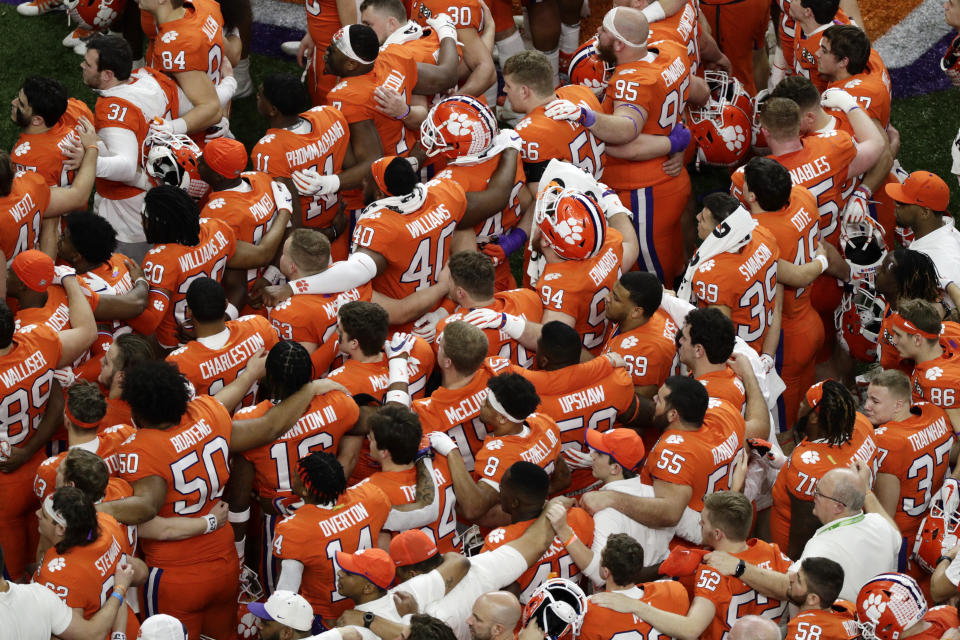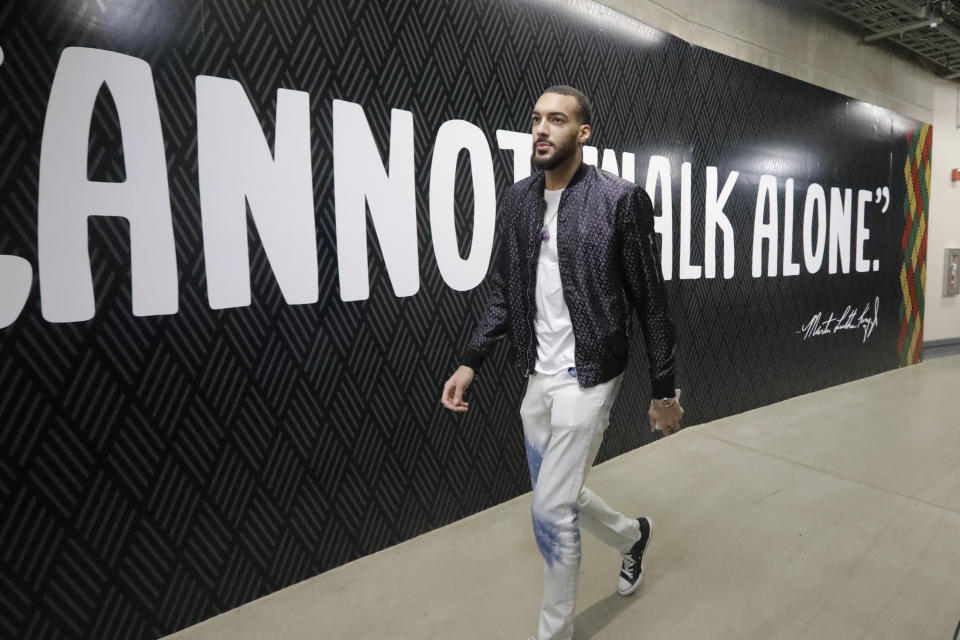Should teams actively seek herd immunity from the coronavirus?
The idea has arisen inside college football locker rooms; on Paul Finebaum’s radio show and Boomer Esiason’s; and even, sources say, during a recent Pac-12 meeting. On Friday, coaches and athletic department officials convened virtually with the conference’s coronavirus advisory committee. An anonymous question was put to the medical experts.
Would it be possible, or make sense, to intentionally create team-wide herd immunity?
It’s a question that has been lurking for weeks now. It gains steam as Clemson rolls on despite 37 positive COVID-19 tests. Most college athletes who contract the virus, the thought goes, will be asymptomatic or mildly symptomatic. They’ll recover and become immune, or so they think. They’ll be free to live life and compete. One Power 5 athletic director told Yahoo Sports that multiple football players and other athletes have said they’d like to get the virus now, so that they don’t have to worry about missing games in the fall.
And while coaches clearly want players to be healthy, now and throughout the season, some have mentioned to Yahoo Sports that teams with large early summer outbreaks could be at a competitive advantage come September.
Yahoo Sports presented the concept to a dozen health experts, some of whom have advised Power 5 conferences or the NCAA. A few acknowledged the superficial logic. “I can see why people are thinking about that,” says Bill Schaffner, a renowned infectious disease specialist at Vanderbilt University.
Ron Waldman, an epidemiologist at George Washington University, says of the “competitive advantage” concept: “It’s a strange way of putting it, but the statement itself is probably correct.”
They and other experts, however, say there are several reasons the presumed advantage might not be nearly as significant as it appears. Many pinpointed sustainability of immunity and long-lasting complications as two massive unknowns. And besides, Waldman says: “It seems somewhat perverse to be talking about [COVID-19] in those terms.”
Furthermore, acknowledging competitive advantage and creating it by purposely contracting a potentially deadly disease are two different things. When asked whether intentional infection is a valid strategy, experts give the same answer that members of the Pac-12’s medical advisory committee gave on Friday. Unequivocally.
“No,” says Matt Turnbull, a virologist at Clemson.
“There's absolutely no validity,” says Paul Pottinger, professor of infectious diseases at the University of Washington. “It's a terrible idea, and under no circumstances should anybody think about it.”

The uncertainty of immunity
At the heart of this “terrible idea” is the concept of immunity. You contract COVID-19. You develop antibodies. After recovering, you become immune. That’s how other coronaviruses operate. That’s how most experts assume this one does.
“The issue with immunity,” says Chunhuei Chi, director of global health at Oregon State University, “is how long it lasts. And this varies greatly across different communicable diseases. Some last for lifetime. Some last for only a few months.”
And because COVID-19 is so new, researchers aren’t sure where it falls on the continuum.
Chi points to a recent study that followed 74 former patients, half of whom were asymptomatic, all of whom recovered. It found that antibody levels fell sharply over the three months after a person’s initial infection. And while it didn’t prove anything, Chi says it confirmed suspicions that immunity may last only a few months. “And that's not good news,” he says.
He also points to another finding: “For the asymptomatic patients, immunity is even shorter.” In other words, there appears to be a relationship between degree of sickness, immune system response and antibody strength. “Young people who have mild disease or asymptomatic disease, their antibodies may never rise very high,” says Sankar Swaminathan, chief of infectious diseases at the University of Utah. “We don't even know if those antibodies are protective.”
All of which means that a college football player who contracts the disease in June very well could contract it again in October. And he’d test positive. And he could get sick. And he’d have to sit out for at least 10 days.
This also presents a cascading problem. “We cannot give people certificates of immunity to play for the season just because they've had [COVID] before,” Swaminathan explains. “Let's say that I'm Joe Lineman. I get sick. [Two weeks later], I'm clear, I'm fine. [Next month], I'm ready to go play The Ohio State University. Then it turns out that my roommate, who had not had [COVID-19] before, tests positive before the game. Guess what? I may not get to go play The Ohio State University on Saturday. Because I've been exposed.” And because immunity can’t be counted upon, protocols for “close contacts” may apply to Joe Lineman just as they would to a player who hasn’t previously contracted the virus.
“Basically,” Chi says in conclusion, “don't count on herd immunity.”
What about long-term complications?
Proponents of intentional infection, experts say, also underestimate the risk. It’s indeed lower for college athletes than for the average American. “It’s not zero,” Schaffner says.
“Maybe the majority of them, because they're young and healthy, aren't going to show symptoms,” Turnbull says. “But some are going to show symptoms. Some are going to show very severe symptoms.”
“And you can't always predict who that's gonna be,” adds Jon Drezner, director of sports cardiology at the University of Washington. “Sometimes it's the apparently fully healthy individual. … You just don't know.”
The death rate among the college athlete demographic is almost certainly a small fraction of 1 percent. But there are other worries. Drezner says “we’re still learning” about potential long-term effects of the virus. “We don't totally know. What we do know is that there are both cardiac and pulmonary complications from severe illness. If we look at individuals who have been hospitalized, the sickest of the patients who get COVID-19, they have about a 1-in-5 chance of injury to their heart or injury to their lungs that can be long-term. That's really significant.
“What that has made us do in our young athlete community is ask the question, what happens if you're asymptomatic? What happens if you only have mild symptoms, or maybe just a flu-like illness, but don't have to go to the hospital? Are you still at risk of heart and lung complications?
“My own opinion, and that of some of the experts I've worked with, is that the chance that you have a heart or lung complication is directly related to the severity of the illness. And so I think it's a very low likelihood that somebody who has an asymptomatic carriage of SARS-CoV-2 ends up having a heart problem from that. I think it's really unlikely. But again, we just don't know yet.”
Some experts point to high-profile case studies to show that the chance of significant symptoms isn’t negligible. Von Miller had a “frightening” experience that included difficulty breathing. Rudy Gobert still hasn’t fully recaptured his sense of smell. Swimmer Cameron van der Burgh, an Olympic gold medalist, fought COVID for weeks, and called it “by far the worst virus I have ever endured, despite being a healthy individual with strong lungs, living a healthy lifestyle and being young.”
Other experts, such as Zachary Binney, an epidemiologist at Emory University, point out that “not everybody involved in a college athletics program is a young, elite athlete. You have coaches, you have medical staff, you have officials, you have trainers, you have people who can be old and have preexisting conditions.” You also have professors, and family members, and soon-to-be-full campuses.
“We also need to worry about them,” Binney says.

A risk not worth taking
The question of intentional infection, like so many coronavirus questions, is one of risk and reward. The risk, for young athletes, is minimal. The reward, in theory, is timely immunity. The question, therefore, is seductive.
The experts’ counterargument, in summary, is that the risk – to athletes themselves, and to others – is more considerable than most realize. The reward, immunity, is fallible. It may not be so timely. The risk, therefore, isn’t worth taking.
“If you were a coach,” Turnbull says, “and you were really looking toward October, November, December to make your move toward the [College Football Playoff], and you thought the best thing to do would be to go ahead and have a coronavirus party, like the old Chickenpox party, that's problematic.”
Says Jared Baeten, an epidemiologist at the University of Washington: “If we knew that getting immunity now would protect somebody thereafter, and we knew that that person wouldn't get sick to a bad degree, yeah, of course that would be the thing to do. But we don't know that one of these students is not going to get deathly sick. And that's what everybody has to weigh.”
“We don’t know” remains the common refrain, and the concealer of risk, in large part because the virus is mere months old. Longitudinal studies aren’t yet very long. Perhaps some young adults feel comfortable with what they believe to be the risk. But not even scientists know what the risk really entails, nor the benefits it brings.
“I don’t think anybody should be out there seeking infection,” says Annabelle de St. Maurice, a professor of infectious disease at UCLA. “There are no medical professionals that I think would advise that.”
“We're talking about a potentially severe illness,” Waldman says. “An illness that could end in death, that can have severe long-term consequences. And we're weighing it against college football. I think we need to keep things in perspective.”
Yahoo Sports’ Pete Thamel contributed to this story.
More from Yahoo Sports:

